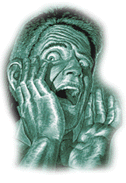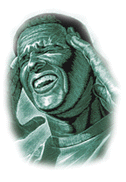 |
Question: What is the internet? |
Answer: The Internet is a LARGE worldwide network of computers. |

Yes, it is a large network with the ability to send and receive files
from one computer to another. The three main defining characteristics of
the internet are
-
interoperable
Interoperable means that the standards allow communication across
networks. This does not limit the access of information to a proprietary
site, location, machine or brand name.
-
packet switched
Connections are not FIXED from point to point for the duration of the
transmission. A telephone call is circuit switched - which means a dedicated
path is established to transmit your entire conversation. When data is
sent packet switched over the internet - it transmits a small part
of the data, verifies it is correct, then sends more information toward
the destination. Packet switched networks do not require all of
the information to be delivered through the same path. By not dedicating
the path for the duration of the connection, this method allows more connections
to be sending information across the same space or allows for sharing resources.
-
data network
A network that carries data information (digital - computer) instead
of voice information (analog - telephone). There are many instances where
these "definitions" of data and voice are starting to overlap. Computers
connecting to regular phone lines are technically carrying data over a
voice line and in some progressive parts of the country digital phone lines
are starting to make appearances.
TCP/IP is a standard of over 200 protocols that define the language of
the internet. Some of the most common elements of the internet include
(but are not limited to):
-
e-mail Send Brad some e-mail
E-mail is electronic mail. It is sent over the internet electronically
instead of over the roads via the US Postal Service. It delivers a message
almost instantaneously to anyone in the world. The messages go into electronic
mailboxes for users to read at their convenience
-
ftp shareware AOL
File Transfer Protocol (ftp) is a method of transferring files to or
from another computer. Whenever you hear of someone talking about downloading
or uploading they are talking about ftp.
-
www HOME at USD home page
The world Wide Web (WWW or W3 or Web) has become a world wide phenomena.
Where other applications rely on your knowledge of Internet addressing,
hierarchial directory structures, and the application's own variations
of command elements, web applications let you navigate by clicking on words
or pictures. These hot links are established through hypertext. Often confused
with the internet - in reality, the WWW is only one of many parts of the
internet.
-
gopher gopher://gopher.tc.umn.edu
Gopher was the first internet application that used a menu driven approach
to navigation. Gopher lacked the graphic and other media rich components
of the WWW that we enjoy today. Today, many sites that contain large bodies
of text are still available through this method.
-
usenet k12 ed life news group
Newsgroups (currently over 50,000) started when a few individuals at
a few campuses wanted to share information with postings that anyone could
access and read. "Legend has it that way back then (about 10 years ago)
you could read every message in every group over a (single) cup of coffee.
Do be aware that if you start reading and participating to these groups,
anyone in the world has access to messages that you post to a newsgroup.
-
telnet list
of Free-Nets
Telnet is a program that allow you to remotely connect to and use a
computer somewhere else.

When did this all start? The main backbone of the network in
the United States is the National Research and Education Network (NREN),
a product of the High Performance Computing Act of 1991, pushed through
congress by then-Senator Al Gore. It was designed to help the K12 and college
communities become part of the Internet more easily.
Question:How many computers are hooked up to the internet today?
Answer: The number of hosts (or individual computers) is currently
45 million. Source:MacMillian,
January 1999
Question: Where is it all headed?
Answer: NUA, one of Europe's leading online consultants and
developers, estimates the number of Internet users world wide to be 100.5
million. By the year 2000, analysts predict that number will jump to 200
million. Source: NUA, January 1998 Several different analysts agree
that the numbers will approach 200 million by the year 2000.
Question: Why is the internet such a big deal?
Answer: The internet is a powerful communications tool. In and
of itself, it is no more than a bunch of wires and computer, but it empowers
its users with instantanious access to data, toolsand the power to accomplish
many different tasks.
668



